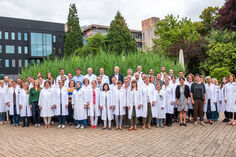Prioritization by pArticipation (PACT)
a method to integrate needs, values, and Complaints of older patients with multiple morbidities into Treatment planning
Summary
To date, there is a myriad of studies to improve older patients’ drug treatment. However, these approaches have often failed to improve health-related outcomes such as quality of life, burden of disease, or occurrence of adverse drug reactions. Particularly in older patients it is crucial to make treatment decisions against the background of patients’ values and priorities. To this end, both a thorough and detailed knowledge of the patients’ situation, complaints, needs, and priorities as well as a firm understanding of how these complaints may relate to the patient’s disease, drug treatment, or psychosocial factors is essential. Only then, reported complaints can be transferred to treatment decisions initiating remission, relief, or suggesting appropriate coping strategies.
The aim of the study is to develop and validate an assessment tool to capture the patients’ health-related needs, values, complaints, and priorities in order to match them to the current pharmacological and non-pharmacological treatment plan and deduce options for improvement. To achieve this objective, a wide range of priorities, values, and problems will be assessed in older patients with multiple morbidities. The method developed in this project allows the engagement of patients in clinical trials and fosters their decisive role in any clinical intervention.
A first description of the assessment in PACT is published at:
Project Management
Prof. (apl.) Dr. sc. hum. Dipl. Math. Dipl. Psych. Beate Wild
Dipl. Math. Dipl. Psych., Leading Biometrician
PD Dr. Sc. hum. Hanna Seidling
Working group: MD F.Böhlen, pharmacist M. Kusch, psychologist P.Reich, pharmacist V. Wurmbach
Cooperation partners: Prof. Walter Haefeli, Department of Clinical Pharmacology and Pharmacoepidemiology, University Hospital Heidelberg
Duration: 2017 - 2021
Supported by: Ministry of Research and Education









